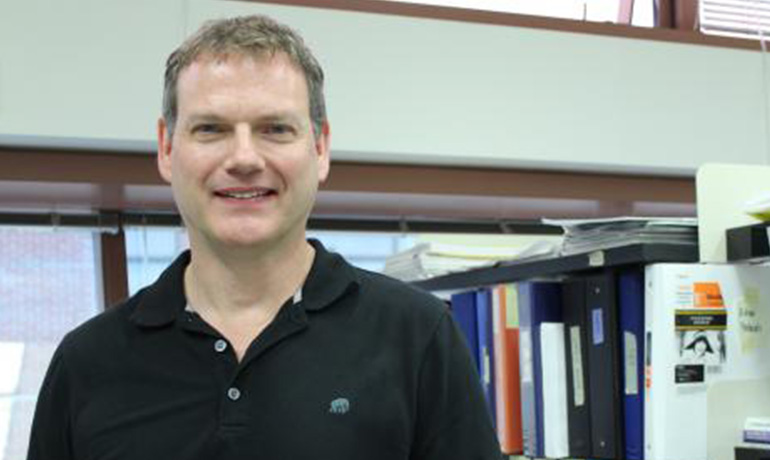
The path to discovering a cure for breast cancer is fraught with twists and turns, but Douglas Thomas, PhD believes he may be traveling on the right road.
Thomas, University of Illinois Cancer Center member and associate professor of medicinal chemistry and pharmacognosy in the UIC College of Pharmacy, is working to identify epigenetic pathways that control specific phenotypes in cancer cells to learn how they become drug resistant, with the goal of testing drugs to target or reverse drug resistant phenotypes.
“Although cancer is caused by genetic mutations, scientists today are learning that many of the deleterious phenotypes or characteristics of cancer are governed by epigenetic pathways as well,” Thomas said. “The good thing about epigenetic modifications, unlike your DNA, is that they can be reversed.”
Histone modification play important roles in epigenetic regulation. Histones are highly conserved basic proteins that act as spools around which DNA winds to form chromatin. The compactness allows the DNA to fit into a much smaller space than it would otherwise. Thomas is investigating whether drugs that can alter chromatin structure by modifying histones are a viable option to treat aggressive cancers.
Many of these drugs, such as HDAC inhibitors, have been studied in preclinical and clinical settings to treat a host of diseases, but more recently these drugs are being investigated as possible treatments for cancers. Some success has been reported, especially for various types of leukemia. These classes of drugs have shown some efficacy in cancer treatment, but “the problem is the mechanisms of action of many of these chromatin modifiers cannot be directly linked to the clinical outcomes, and it’s not well understood how they work in limited settings,” Thomas said.
Thomas and his laboratory are not limiting their research to HDAC inhibitors. They are also testing numerous epigenetic compounds in cell culture systems with the hope that they soon will be analyzed in animal models. Before the drugs are blindly tested in animals, however, “we intend to first ‘map out’ their targets and down-stream effects.
“Understanding the pathways and epigenetic modifications will tell us which potential drugs might work or which epigenetic pathways might be worth targeting,” Thomas said. “We can then collaborate with medicinal chemists to optimize these drugs to more specifically target these pathways. The goal is to either directly inhibit tumor growth with the epigenetic drugs or to reprogram the cells so they will be susceptible to the existing chemotherapeutic agents that they may have developed resistance to.”
Thomas “stumbled” across the link between epigenetics and cancer after conducting extensive research on the free radical signaling molecule nitric oxide. Cancers that contain high levels of nitric oxide “tend to be more aggressive and drug resistant,” he said. Thomas is the first to establish that nitric oxide – a gaseous signaling molecule crucial for intercellular communications and health – determines the fate of tumor cells by controlling specific epigenetic pathways rather than through classical signaling mechanisms.
Nitric oxide has been recognized as a significant contributor to cancer pathophysiology for many years. However, specific details to explain these associations have remained obscure. Thomas’ studies offered a unifying explanation that helped determine why nitric oxide exerts such a broad spectrum of effects on cancer etiology, both positively and negatively.
“For a certain population of patients, such as those with triple negative breast cancer, nitric oxide has been shown to be associated with worse patient outcomes, and these cancers may therefore be significantly regulated by epigenetic means,” Thomas said.
Thomas is considered a pioneer in the field of nitric oxide, and since arriving at UIC 11 years ago he has published numerous papers on the subject and has been funded through federal and association grants. In 2015 he has named a UIC Researcher of the Year: Rising Star in Basic Life Sciences.
The son of a renowned cancer epidemiologist who once considered a career as an actor, Thomas can’t envision performing any other role than that of a cancer researcher.
“I love what I do,” he said. “I like the idea of discovering things, unraveling how nature works. That’s exciting to me. I learn something new every day. For me personally, it not just the knowledge, but how I conduct my research and become a better mentor for my students.
“I really enjoy mentoring my students and seeing them get excited about research. Once experiments start working, that’s when it really becomes fun. Science is so unpredictable. You go down one path, and if that doesn’t work you go down another and often times you find where you wind up is more interesting than where you initially intended to go.”
